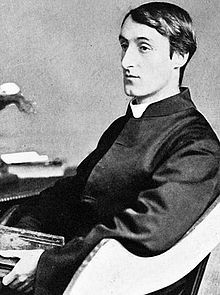Wednesday, November 12 “3 Feet in some places”
Gerard Manley Hopkins, sj looked inside the death of summer and the coming of cold weather as sacred beauty, the play of God with the earth; the poet recognized the gaze of human beings, moved to joy by sheer beauty, as prayer. As today’s reports of deep snow up north reminds us, we recognize autumn’s passing splendor. Northern Michigan U is closed due to “terrible weather.” Rather than sacrifice the joy of the leaves dancing all around us here in Detroit to premonitions of gloom, I want to offer some stillness to this day.
You too?
Have a blest day,
john sj
Today’s Post Best to read aloud, with pauses.
“Hurrahing in the Harvest”
SUMMER ends now; now, barbarous in beauty, the stooks arise
Around; up above, what wind-walks! what lovely behaviour
Of silk-sack clouds! has wilder, wilful-wavier
Meal-drift moulded ever and melted across skies?
I walk, I lift up, I lift up heart, eyes,
Down all that glory in the heavens to glean our Saviour;
And, éyes, heárt, what looks, what lips yet gave you a
Rapturous love’s greeting of realer, of rounder replies?
And the azurous hung hills are his world-wielding shoulder
Majestic—as a stallion stalwart, very-violet-sweet!—
These things, these things were here and but the beholder
Wanting; which two when they once meet,
The heart rears wings bold and bolder
And hurls for him, O half hurls earth for him off under his feet.
Gerard Manley Hopkins, sj 1844-1889
p.s. Looking for a new prayer to honor UDM’ s vets yesterday I came across a short post about families of vets. It’s not for the faint of heart; reading it as if it were a poem helped turn it into a prayer and a reminder that right now c. 100 vets are part of our UDM community of research, teaching, and learning.
While it’s well known that 22 veterans a day kill themselves, a CNN investigation revealed that many military family members also have attempted or contemplated suicide.
“The Uncounted” examined how war’s trauma can wrack entire families. Family members have endured unprecedented multiple deployments during two wars, in Afghanistan and Iraq, lasting more than a decade. That means financial and emotional stress for relatives.
If a family member returns from war, it’s often the relatives who must care for them.
“If we can’t figure out a way to provide better support for families, the public will pay one way or another,” said Kristina Kaufmann, executive director of Code of Support Foundation, which tries to bridge the gap between military and civilian communities. . . .
“Don’t be afraid to approach us. This heartache I have — it makes other people uncomfortable. It hits them in a place that scares them,” said New Jersey parent Bill Koch, whose son Steven died in Afghanistan in 2008. His daughter committed suicide two years later, an act her parents believe was inextricably tied to losing Steven.
“It can hurt so much more when we feel like we’re making other people uncomfortable by talking about our kids,” Koch said. “Don’t push military family members away because you’re afraid you’ll say the wrong thing. Just asking us means you care, and that means everything.”
from “5 ways to honor veterans beyond Veterans Day” By Ashley Fantz, CNN

